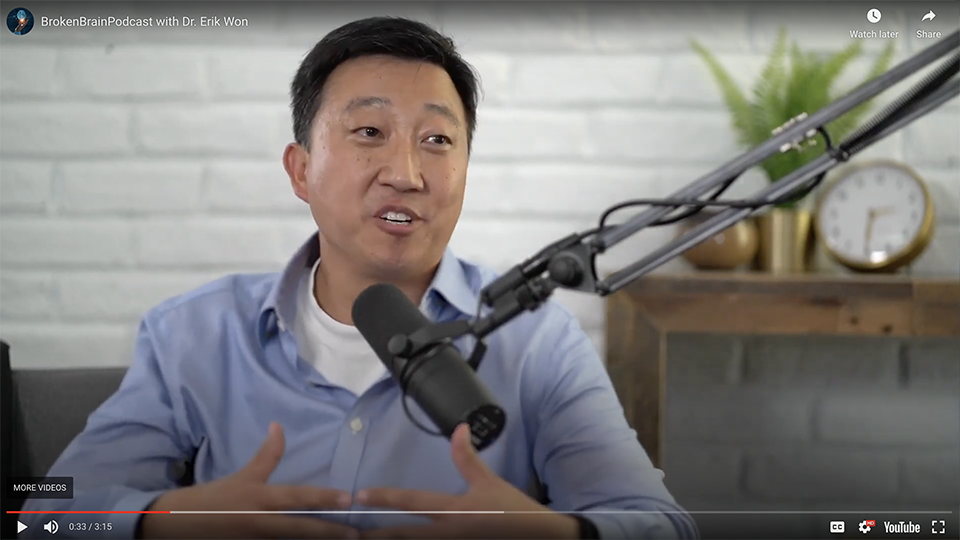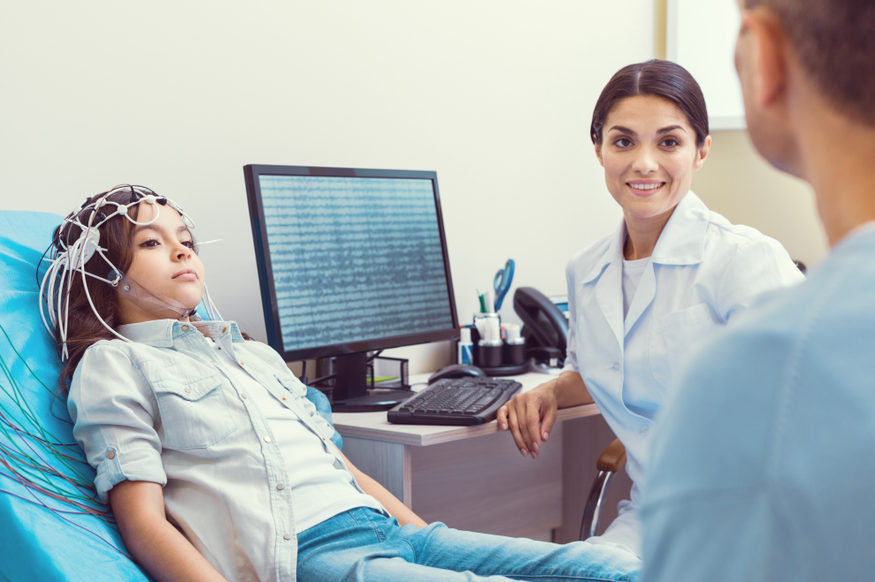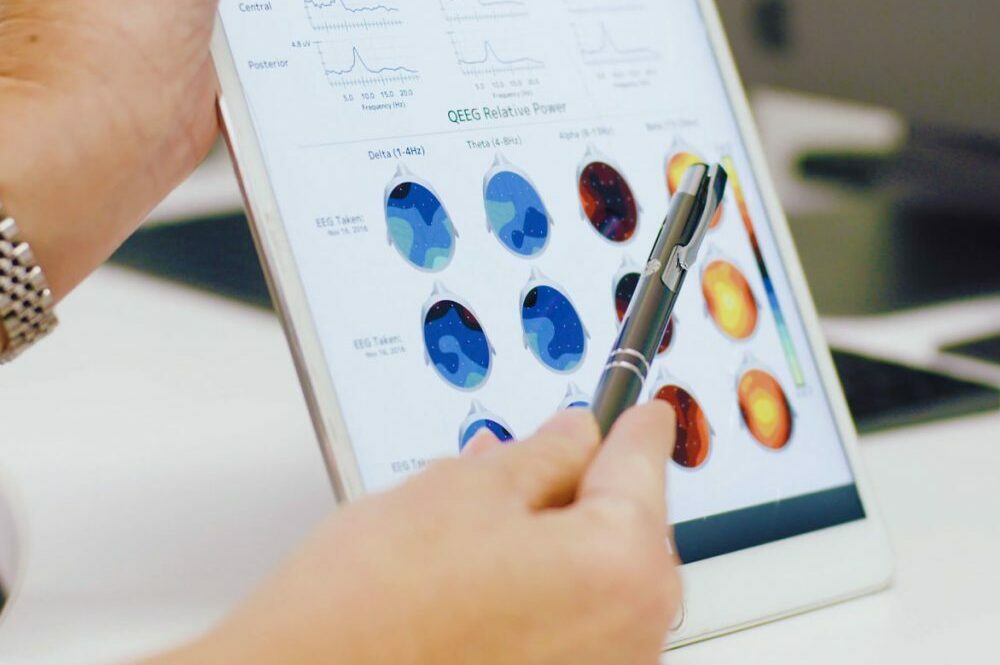
PTSD
Post Traumatic Stress Disorder
A New Drug-Free Approach to Treatment
Mert, magnetic resonance therapy
MeRT for PTSD
Post Traumatic Stress Disorder is a mental health problem that’s triggered by terrifying events that are either experienced or witnessed or from prolonged periods of severe stress. The majority of people that experience traumatic events may have some difficulty coping afterward, but with time and self-care, they usually recover.
For others, symptoms will continue to get worse and can last months or possibly years. Symptoms may not surface immediately after the trauma and can actually occur many years later, such as a child abuse case. Research indicates that during the past year, an estimated 3.6% of adults experienced PTSD. Of those adults, 5.2% were females and 1.8% were males.
What makes MeRT stand head and shoulders above other treatments?
A non-invasive, drug-free treatment for PTSD is now available in Dallas, Texas. Neurologist, Dr. Spencer Miller, has brought this incredible technology to Dallas. It’s called MeRT®, which stands for Magnetic e-Resonance Therapy. Simply stated we use a magnetic field to stimulate and balance brain function, guided by very sophisticated imaging and diagnostics.
The patient’s initial tests are analyzed very carefully as to the brain’s pattern of function and activity. Through this detailed analysis, we are able to determine the correct neural synchronization. This information is then used to devise a highly personalized protocol for each patient, with the purpose of encouraging improved brain communication. This can lead to significant clinical improvements.*
This incredible technology has now been used to help hundreds of veterans experiencing PTSD. You can read the article about this HERE.
The TMS equipment used is FDA-cleared to treat Major Depressive Disorder and OCD and is used off-label to treat other neurological-related conditions, including PTSD.
It was absolutely terrifying to not know what was wrong with me or how to fix the problem. BTC not only identified the deteriorated state of my brainwave activity, they restored its function… I consider the healing I experienced at BTC to be nothing short of a miracle.”
– US Army Veteran
Spencer O. Miller, M.D. is a Board-Certified Neurologist in Dallas, Texas. He received his medical degree from the University of Mississippi School of Medicine and has been in practice for 13 years, 5 of which were in the USAF, where he saw all types of brain injuries, including soldiers suffering from PTSD and TBI. He specializes in the treatment of ADHD, sleep disorders, traumatic brain injury, depression, post-traumatic stress disorder, dementia, autism, and multiple other brain disorders at his clinic, the Brain Treatment Center Dallas.
“We’re trying to make the brain operate as efficiently as possible.”
We measure the electrical signals in the brain in frequency and location and neural networks as to where things actually occur in the brain. And when we see on an EEG [electroencephalogram] that there is an abnormal signal somewhere in the brain or a low frequency or discrepancy or asynchrony in frequencies. …
The brain has an intrinsic frequency and… all of us have a unique intrinsic frequency — it’s different for everybody. And if you can align all of the brain tissue to operate under that same frequency that’s called synchrony coherence efficiency. …We’re trying to make the brain operate as efficiently as possible.”
–Dr. Spencer O. Miller, Neurologist, Owner and Medical Director of Brain Treatment Center Dallas
Symptoms and Causes of Post-Traumatic Stress Disorder
Symptoms of PTSD can significantly alter the quality of life, the ability to cope with everyday stressors, and relationships. Some examples of symptoms can include:
- Depression, negative outlook.
- Anxiety and panic attacks.
- Flashbacks to the event.
- Inability to sleep or repeated nightmares about the traumatic event.
- Avoiding people, places, or events that remind you of the trauma.
- Difficulty concentrating/memory problems.
- Hopelessness.
- Feelings of numbness.
- Changes in temperament to include anger and rage.
- Engaging in self-destructive behavior.
- Hyper-alertness to sounds.
- Easily startled.
- Physical and emotional reactions to loud noises, etc.
- Thoughts of suicide.
Some of the most common events that can lead to Post Traumatic Stress Disorder include combat exposure, sexual or physical assault, childhood abuse, an accident, or any other trauma such as a fire or a plane crash that is threatening to your life.
Many things can contribute to PTSD other than the trauma itself. If you have experienced multiple traumas in your life, or you have a personal or familial history of mental illness such as depression/anxiety, then you may be at higher risk. Other risk factors include:
- Exposure to intense or lasting trauma.
- A career in the military or as a first responder.
- A history of substance abuse.
- Not having a good support system of family and/or friends.
“It was life-changing…”
I received MeRT treatment from Dr. Miller back in 2021. It was life changing! I have struggled with Complex PTSD for many years. After treatment, I was able to get off of my medication and have been thriving. Highly recommend anyone struggling with PTSD, depression, and/or anxiety to look into this treatment. It is worth the time and money to get back to your old self. Dr. Miller truly saved my life by treating me and I can’t thank him enough!”
– Kasey C.
Treat PTSD with MeRT
Veterans tell their experience with MeRT Treatment
MeRT has shown incredible results in improving the lives of those suffering from PTSD.
MeRT Treatment Featured on The Broken Brain Podcast
The Broken Brain Podcast explores the inner workings of the brain and body. One episode featured MeRT as a breakthrough treatment for a variety of neurological issues, particularly PTSD.
Dr. Eric Won from Wave Neuroscience (the parent company of MeRT) speaks about using MeRT treatment with members of the military who have experienced depression, TBI, and PTSD because of their service to their country. Dr. Won also gives testimony to the incredible successes that these veterans have realized from treatment.

Successes from Mert Treatment for PTSD
“THANK YOU SO VERY MUCH for your help with TMS/MeRT for my PTSD symptoms! Refiring those frontal lobe neurons had me reading ten novels in six months! I’ve NEVER read that many in ALL my prior life!
“The confusion, distraction, and memory issues were greatly reduced. The treatment does wonders. And whatever you did last time had an unexpected, incredibly wonderful effect. Besides helping with my sciatic, shoulder, and leg pains, I STOPPED TAKING OPIOIDS A WEEK AFTER, COLD TURKEY, unexpectedly AND WITH ZERO WITHDRAWAL SYMPTOMS!
“IT WAS LIKE I’D NEVER TAKEN THEM, but the truth is that I did for at least a decade prior. Now, while I do have some pains, I take NO OPIODS! I manage with ibuprofen, and Tylenol. This is worth every penny. THANK YOU!”
PTSD Patient
Patient“Combat has robbed me of the ability to show my husband spontaneous affection. My husband’s PTSD is so severe that if I reach for him, he flinches. He swings at me and pushes and has actually smacked me.
“I have not been able to go up behind him and put my arms around him for seven years. But I was finally able to for the first time yesterday after only two days of treatment.
“I actually walked up behind him, and he didn’t jump or flinch as I hugged him. He instead turned around and hugged me tight, kissed me, and said, ‘I love you, love.’ He’s usually never affectionate, loving, or happy towards me. That’s a miracle.”
Wife. of Marine Veteran
“Of all my injuries, by far the worst were the ones you could not see. I had degraded to the point of not being able to leave my home because of panic attacks and severe anxiety. I could not hide from this feeling, and no medication could numb it.
“At one point, I told my doctor I couldn’t kill myself because I have a family with young children that I am responsible for. I was living in despair and physical pain every day without reprieve — that is, until I was able to get treatment.
“I underwent neural restorative therapy [MeRT] for two months with total symptom resolution. Now I can function again at work and can spend much-needed time with my family. I have my sense of well-being back and a clarity of thought I haven’t had in many years.”
US Army Veteran
“We have seen a dramatic change in Alex. He is so calm, happy, and positive. He wakes more alert. The man I knew was inside of him has finally come out. We are so much closer as a couple, and the relationship between our kids and him is much more functional.
“The VA has treated him for the past six years, and he’s undergone so much individual and group therapy, but it has NEVER had this positive effect on him. I will forever be grateful.”
Wife of Army Veteran
“With being diagnosed with PTSD, depression, and anxiety by Veterans Affairs, a calm and welcoming environment is important. The treatment makes me sleep longer and deeper than before treatment. My ‘dark feelings’ fade away. I feel happy and calm.”
Sean K.
“It was absolutely terrifying not to know what was wrong with me or how to fix the problem. MeRT not only identified the deteriorated state of my brainwave activity, it restored its function. I consider the healing I experienced to be nothing short of a miracle.”
US Army Veteran
“Within four days of being treated, I was sleeping through the night. My anger had subsided significantly, and I was smiling and enjoying things again. I was able to focus and concentrate on information much more efficiently and easily and did not get lost in conversation as I had prior to coming to BTC. My chronic headaches had ceased, my balance was returning, and my ringing in my ears (tinnitus) had also ceased.”
Marine EOD Tech
Patient“The experience I had at BTC was nothing short of a miracle. The treatment I received has completely changed my life for the better.
“I was able to reset my circadian rhythm and sleep through the night without medication. My nightmares became few and far between. My anxiety lessened almost immediately, and I became able to do the things I used to enjoy, like going to the gym, cooking, and reading.
“I could focus my attention again, and my mood lightened a lot. My fiancé and family immediately noticed the change in me and said that it was like they had gotten their ‘old’ Sarah back.”
US Army Veteran
PatientMeRT therapy for PTSD is grounded in years of independent, peer-reviewed research.
This innovative treatment is a tailored adaptation of rTMS (repetitive Transcranial Magnetic Stimulation). The methodologies and principles behind rTMS are supported by extensive studies published in leading scientific journals. Here are a few notable examples.
A retrospective chart review to assess the impact of alpha-guided transcranial magnetic stimulation on symptoms of PTSD and depression in active-duty special operations service members, 21 June 2024.
“This data provides a demonstration of significant reduction in PTSD and depression symptoms and safety with the application of a-rTMS in active-duty special operations military personnel. Expansion of targeted neuromodulation programs could be impactful for military and civilian populations.”
How Electric Therapy Is Curing Navy SEALs of PTSD, Jan 2019.
“Hundreds of vets have tried out an experimental new treatment that could change how the world addresses mental disorders.” And, “All said that they saw big improvements after a course of therapy that ran five days a week for about four weeks.”
Synchronized transcranial magnetic stimulation for posttraumatic stress disorder and comorbid major depression.
“All participants demonstrated significant reductions in PTSD and MDD symptoms (all p < .001). As expected, there were significant reductions in symptoms in both treatment groups, but active stimulation did provide greater reductions in count of PTSD moderate-to-severe symptoms.”
Magnetic Resonance Therapy Improve Clinical Phenotype and EEG Alpha Power in Post-traumatic Stress Disorder, in Trauma Monthly, November 2015.
“This study suggests that non-invasive neuromodulation magnetic resonance therapy may lead clinical improvements as well as a trend toward normalization of EEG pathophysiology in PTSD.”
Magnetic E-Resonant Therapy Alleviates Combat Related Post-traumatic Stress Disorder, in Aerospace Medical Association, March 2017.
“Our preliminary results suggest that transcranial MeRT may provide an alternate method to help veterans suffering from PTSD.”
Individualized Electromagnetic Treatment in Posttraumatic Stress Disorder: a Randomized, Double-blind, Sham-controlled Trial, Poster Accepted, Taghva, et al.
“This double-blind, randomized, controlled trial shows that transcranial magnetic therapy based on individualized frequencies derived from EEG/EKG is an effective therapy for PTSD in improving overall symptoms and quality of sleep.”
EEG_EKG Guided TMS in veterans with PTSD_Randomized double-blinded pilot study.
“Following 2 weeks of EEG-EKG guided transmagnetic stimulation, significant changes in symptom severity and EEG measures are reported for 80 retired military veterans with post-traumatic stress disorder. Patients had greatest comparative reductions in PCL-M subscales VII “avoid situation indicator” XII “short future indicator” and XIII “trouble falling or staying asleep indicator”. The improvement in sleep was confirmed for treated vs sham group in PSQI-A, and, may suggest correlation between sleep disorder and PTSD symptoms. Of the 37 patients who had suicidal ideation by HAM-D, 29 patients denied ideation by 4 weeks. No patient worsened in clinical PTSD symptoms after receiving therapy. “
Low-frequency, Repetitive Transcranial Magnetic Stimulation for the Treatment of Patients with Posttraumatic Stress Disorder: a Double-blind, Sham-controlled Study, Nam et al, 2013.
“The present study showed low-frequency rTMS to be an effective and tolerable option for the treatment of PTSD. Trials using variable indices of rTMS to the right prefrontal cortex and explorations of the differences in the effects on specific symptom clusters may be promising avenues of research regarding the use of rTMS for PTSD.”
Contact our New Patient Coordinator for More Information about MeRT
When many patients come to see us, they have lost hope as they don’t see any light at the end of the tunnel. It’s rewarding as a practitioner to help so many people realize a much better “normal” and improved quality of life.
If you have questions or would like to discuss our treatment protocols, we offer a free consultation by phone.
Our New Patient Coordinator will take the time to listen and explain. She is able to answer most questions and discuss our protocols, scheduling, fees, and other information. She is happy to assist you in any way she can.
Please call us to get more information about how our clinic and Dr. Miller may help you with your health goals and to schedule an initial screening to see if MeRT may be an option.
Contact our New Patient Coordinator
for more information. Or fill out the form below.
Starting as a New Patient
When you start as a new patient at the Brain Treatment Center Dallas, you will initially need two appointments, approximately two days apart. Both appointments will be about an hour in length. These appointments will be used to determine if Dr. Miller feels you can truly benefit from the MeRT Program and, if so, to develop a tailored treatment plan based on your test results. After testing and Consultation, you are not obliged to begin treatment. This is something that you will determine once you have seen your test results and consulted with Dr. Miller.

Initial Testing
At the first appointment, we will go over your reasons for seeking help, your medical history, your health goals, and all of your symptoms. You will then begin initial testing, which will involve an EEG and an EKG. These are both completely painless and easy and done right in our office. We then send your information and test results to our scientific and clinical teams, who will carefully analyze the results and determine the current state and functioning of the brain together with Dr. Miller.
We use a patented, scientific approach with the neurophysiological data gathered through testing to develop a highly customized treatment plan aimed at encouraging healthy brain communication and function.

Consultation
At your second appointment, you will meet with Dr. Miller for a Consultation. He will discuss your test results and whether he and our scientific team feel you may achieve results through our treatment protocol. This appointment will also serve to answer any additional questions you may have. After that second appointment, Dr. Miller will lay out your individualized treatment plan and the protocols to be followed for the best results. At that point, you may discuss fees, length of treatment, and schedules, and then decide whether to go forward and schedule your treatment.

Test Run – The Assessment
We deliver the MeRT protocol using TMS. You simply sit in a comfortable chair while a trained technician carefully positions a simple device on your head. This device produces a magnetic field to induce mild electrical currents in the targeted regions of the brain. There is no pain and no electrical currents, just a slight sensation.
We will perform an additional EEG and EKG after about a week of treatment, allowing us to assess progress and make any needed modifications. In this way, we are always taking the best and most exacting approach based on the current neurological state.
Insurance Coverage
Unfortunately, we do not accept insurance, nor file it on your behalf. However, we can provide you with CPT codes and a billing breakdown. You can submit these to your insurance for possible reimbursement for conditions that have TMS has been FDA-cleared to treat, such as Major Depressive Disorder and OCD. On occasion, individuals have been successful in receiving reimbursement for EEGs and clinical evaluations, and possibly other elements for treatment, depending on the individual’s coverage. It has been our experience that Medicare does not reimburse any of the treatment costs.
